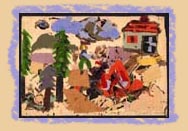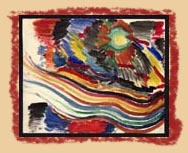Yiddishbuk and Dreams
by Osvaldo Golijov ©2002
Yiddishbuk | ![]() Prayers of Isaac the Blind |
Prayers of Isaac the Blind | ![]() Echoes of Old Worlds, Portents of New |
Echoes of Old Worlds, Portents of New | ![]() Biographies
Biographies
|
Kitty Passerová
 HanuÅ¡ Fischl
 Renata Kitty Fiallová
 Renée Glücklichová
 Artist Unknown
 Jirí Beutler
 Artist Unknown
|
|
St. Lawrence String Quartet with Todd Palmer, clarinet, and composer Osvaldo Golijov
![]() Listen
Listen
Bill McGlaughlin welcomed celebrated Argentinean composer ![]() Osvaldo Golijov to Saint Paul Sunday for an hour-long immersion into his unique artistry. Five acclaimed performers—clarinetist
Osvaldo Golijov to Saint Paul Sunday for an hour-long immersion into his unique artistry. Five acclaimed performers—clarinetist ![]() Todd Palmer and the Saint Lawrence String Quartet—bring a trio of Golijov compositions to life: First we'll hear Yiddishbuk, a visceral string quartet inspired by drawings of children who were imprisoned at
Todd Palmer and the Saint Lawrence String Quartet—bring a trio of Golijov compositions to life: First we'll hear Yiddishbuk, a visceral string quartet inspired by drawings of children who were imprisoned at
![]() Theresienstadt, the deadly "model ghetto" built by the Nazis in 1941. Next, Todd Palmer assumes the role of klezmer with flair, joining the St. Lawrence for two movements of
Theresienstadt, the deadly "model ghetto" built by the Nazis in 1941. Next, Todd Palmer assumes the role of klezmer with flair, joining the St. Lawrence for two movements of ![]() Dreams and Prayers of Isaac the Blind, a work that summons the fading, often insular world of East-European Jewish émigrés in Argentina. The combined quintet closes the program with music from Tenebrae , a work occasioned by Golijov's encounter with François Couperin's mystical Holy Week settings. The composer translates the works' shared name as "darkness illuminated by candelight."
Dreams and Prayers of Isaac the Blind, a work that summons the fading, often insular world of East-European Jewish émigrés in Argentina. The combined quintet closes the program with music from Tenebrae , a work occasioned by Golijov's encounter with François Couperin's mystical Holy Week settings. The composer translates the works' shared name as "darkness illuminated by candelight."
If it's true, as Borges said, that in every man's life there is a moment that defines his existence, then meeting the St Lawrence String Quartet was that moment for me. In truth, I had experienced other defining musical moments up to that one: as a child listening to my mother practice Bach, and being struck by the mystery of simultaneous lines, each complete and beautiful in its own right, making perfect sense together; seeing Piazzolla play in La Plata when I was ten, and being unable to sleep that night; listening for the first time to a recording of The Firebird and then, as a teenager, to Mahler's Second Symphony. Years later, freshly arrived in the United States from Jerusalem, I was shaken by the Kronos Quartet playing Reich's Different Trains. And of course there had been 'life' moments too, some of them beautiful, some tragic, some sad. But life and music converged like never before when I met this quartet in Tanglewood in the summer of 1992.
I had written Yiddishbbuk for the St Lawrence without knowing who they were, trusting to the excitement that Gilbert Kalish and Richard Ortner felt for them. I was, as usual, late with the piece and came to the first rehearsal, two weeks before the premiere, with only the first movement written. Before playing a single note they told me in so many words that they could make no sense of it. I was completely taken aback by their open mistrust, but ready to fight. Barry challenged me to sing it: I sang for a minute and they all said, 'OK, now we get it'. They grabbed their instruments and played that first movement. It felt like lightning.
For the first time in my life I was listening to what I had written being played as vividly as I heard it in my head. I was frozen, speechless, and heard Geoff ask, 'Ozzie, when will you bring the rest of the piece?'. ('Ozzie?' I just met this guy ten minutes ago, he said he didn't know what to make of my music and now I'm 'Ozzie'?) In the event, I wrote the rest of it and then some more. There was no further need to sing: now we were able to work by telepathy. At the premiere they came on stage like hungry cannibals and I felt a strange sense of tranquillity.
In March 1995 the Cleveland Quartet and Giora Feidman were touring the US with Dreams and Prayers in their program. I was convinced that only klezmer clarinetists would be able to play the piece, but the St Lawrences thought otherwise. They asked Todd Palmer, a young clarinetist who had played with them in Spoleto, if he would take the job. 'I don't know if I'm your man', Todd answered, 'I was raised as a Methodist in Hagerstown, Maryland.' Pause. A few months later we all met at Todd's apartment in Manhattan for a rehearsal and I had another revelation: the piece had a future. Todd's interpretation was noble and glowed like liquid gold, and the ensemble with the St Lawrence sounded as if they had played together for years. Since then they have played the piece dozens of times and, in true klezmer spirit, they do it differently each time.
A decade after that first summer I feel our journey of friendship and music to be one of the greatest gifts in my life. Todd (my children's favorite 'uncle'), Marina, Lesley, Barry and Geoff are now part of my family. In fact, they have a knack for creating family wherever they go: they play music completely open, without a skin layer to protect them, and they also live their lives like that. They 'Ozzify' anyone they meet in a matter of seconds, and whenever I am with them I feel that life is just beautiful…I am deeply grateful to all of them.
A broken song played on a shattered cymbalon.' Thus, writes Kafka, begins Yiddishbbuk, a collection of apocryphal psalms which he read while living in Prague's Street of the Alchemists. The only remnants of the collection are a few verses interspersed among the entries of Kafka's notebooks, and the last lines are also quoted in a letter to Milena: 'No one sings as purely as those who are in the deepest hell. Theirs is the song which we confused with that of the angels.' Written in Hebrew characters and surrounded with musical notation, marks similar to those of the genuine texts, the psalms' only other reference to their music is 'In the mode of the Babylonic Lamentations.'
Based on these vestiges, these inscriptions for string quartet are an attempt to reconstruct that music. The movements of the piece bear the initials of the five people commemorated in the work. The first movement remembers three children interned by the Nazis at the Terezín concentration camp: Doris Weiserová (1932-1944), Frantisek Bass (1930-1944), and Tomás Kauders (1934-1943). Their poems and drawings appear in the book I never saw another butterfly, published by the US Holocaust Memorial Museum. The second movement bears the initials of the writer Isaac Bashevis Singer (1904-1991), and the last movement the initials of Leonard Bernstein (1918-1990).
Find out more about:
![]() Osvaldo Golijov
Osvaldo Golijov
Argentinian composer Osvaldo Golijov draws from many influences. There is the classical music and klezmer he learned through his Russian Jewish immigrant parents. There is the passionate tango of Astor Piazzola which resonates through Argentina, as well as the deep, and at times militant, Christianity of South America. Golijov brought all of these influences together in his composition "St Mark Passion". The piece re-tells the story of the Crucifixion from a South American viewpoint. It has been a huge critical success and enraptured audiences. Golijov was in the Twin Cities recently. He told American Public Media's Euan Kerr he finds nothing strange in combining all these different musical threads. (01/01/2003)
![]() Yiddishbuk
Yiddishbuk
A performance by the St. Lawrence String Quartet at the Music@Menlo festival
![]() Kronos Quartet
Kronos Quartet
Listen to Doina and other Golijov arrangements performed on Saint Paul Sunday.
![]() Osvaldo Golijov's Web site
Osvaldo Golijov's Web site
![]() St. Lawrence String Quartet's Web site
St. Lawrence String Quartet's Web site
![]() The Jewish Museum in Prague Terezín Collection
The Jewish Museum in Prague Terezín Collection
![]() Terezín/ Theresienstadt
Terezín/ Theresienstadt









